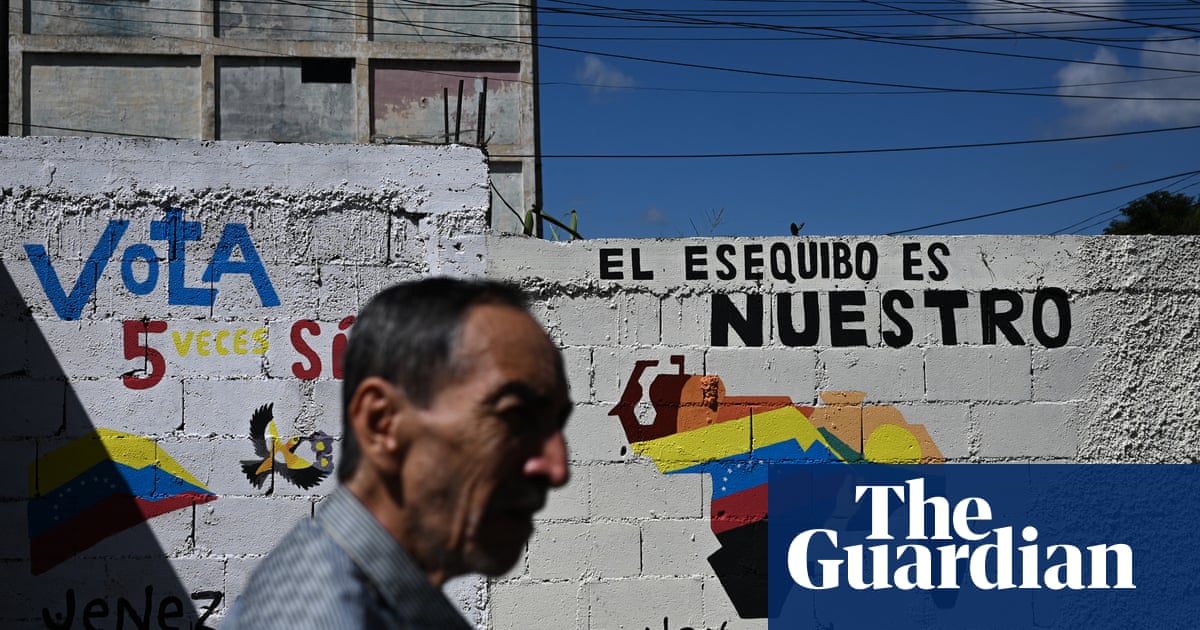Venezuela’s decision to elect officials to administer a swathe of Guyanese territory constitutes “a full-frontal assault onGuyana’s sovereignty and territorial integrity” that “undermines regional peace”, the country’s president, Irfaan Ali, has warned.
Venezuelans will head to the polls on Sunday to chose regional governors and lawmakers, including officials who would supposedly govern Essequibo, a territory which is internationally recognised as part of Guyana. The area is largely jungle but also rich in oil, gold, diamonds, timber and other natural resources.
Ali told the Guardian the move was part of a “campaign to provoke confrontation” and that the “implications are grave – not just forGuyana, but for the entire western hemisphere”.
“The sham elections Venezuela seeks to stage in our territory are not only illegal – they are an act of brazen hostility. This threat is not just aimed at Guyana. It undermines regional peace,” Ali said.
Guyana, an English-speaking former British and Dutch colony, has for decades administered the region, which makes up two-thirds of its territory and is home to 125,000 of its 800,000 citizens. It says the frontiers were determined by an arbitration panel in 1899. Venezuela also lays claim because the region was within its boundaries during the Spanish colonial period.
The centuries-old dispute was reignited in 2015 when the US energy giant ExxonMobil discovered huge crude reserves in the region, and escalated in 2023 when Guyana began auctioning oil-exploration licences.
In late 2023, after holding a referendum asking voters if it should be turned into a Venezuelan state, President Nicolás Madurothreatened to partially annexthe region by force and pledged to hold elections there.
Caracas describes Essequibo as “an inalienable part of the Venezuelan territory and a legacy of our liberators” and has rejected an order by the international court of justice to suspend its plans. “No international pressure, judicial blackmail, or foreign tribunal will make us back down from this conviction,” Venezuela said.
Dr Christopher Sabatini, Latin America expert at Chatham House, said the move to push ahead with elections was “intended to stoke the fires of nationalism”.
Guyana’s chief of defence staff, Brigadier Omar Khan, hascalled on Guyanese Indigenous communities– particularly those living along the border – to share any relevant information about Venezuela’s attempts to organise the election.
“I want you to be vigilant,” Khan told Indigenous leaders on Tuesday.
He also warned that any resident participating in the elections would be charged with treason and other felony crimes.
“If anyone participates or takes any similar action, it will amount to support for a passive coup,” Khan toldthe Associated Press. “Anything along those lines will speak to a violation of our sovereignty and territorial integrity.”
A Venezuelan source said that although the newly created “Guyana-Essequibo state” included the entire disputed territory, voting would only take place in a border municipality in the Venezuelan state of Bolívar. The source said Venezuelan authorities would be unlikely to cross the internationally recognized border.
President Ali said Guyana was a “peaceful nation” but “bows to no bully and yields to no threat”. He added that he “will make every investment – military, diplomatic, technological, and human – necessary to secure and defend our sovereignty and territorial integrity”.
The elections come 10 months after Maduro claimed victory in an election he was widely suspected of stealing.
A deadly crackdown followed, withHuman Rights Watch(HRW) reporting that the government had “killed, tortured, detained, and forcefully disappeared people seeking democratic change”.
Venezuelans will elect 24 state governors and 285 national assembly members in Sunday’s poll, but turnout is expected to be low.
“Last year, Maduro stole the votes of Venezuelans and repressed those who demanded fair counting. It’s hard to see how many of them will turn out to vote again,” said Juan Pappier, deputy director of theAmericasDivision of HRW.
Víctor Alfonzo, a 33-year-old resident living in the state of Anzoátegui, said that the country no longer “believes in the political system”.
“I’m not planning to vote. Neither are my friends, nor my family. We know that everything is a fraud with this government, and we don’t want to participate,” he said.
The Venezuelan opposition has been beset by infighting over whether to abstain from the election, with the handful who are set to run facing bitter recriminations from their political allies.
the opposition leader María Corina Machado has called on voters to stay away in the hope of humiliating the government with low turnout.
But others warn the boycott could play into the hands of the administration. In 2020, theopposition boycottedparliamentary elections, which rights groups sayallowedMaduro’s allies to regain control of parliament.
“Those leaders, the ones that sit out, become irrelevant,” said Sabatini. “They may be marginalising themselves even more, and that, in part, is the government’s plan.”
